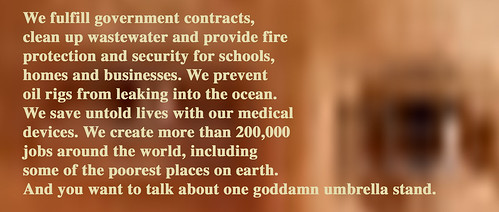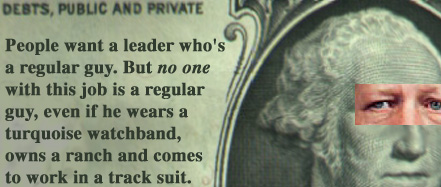I received this email from a reader. The subject line: A Nation with No Middle Ground.
I'm a 57-year-old male who is both conservative, liberal, everything in between. Biggest complaints are (1) how difficult it is to find the truth about anything controversial and (2) frustration with politicians of all parties that can't find common ground for the good of the country.
I would be interested in any web sites, discussion groups, books or whatever that are willing to shed light on the truth and discuss solutions based on reality.
What follows is an expansion of the response I sent him, including additional suggested sources...
Perhaps you have had the experience of reading a news story you know something about, and have been disappointed by what you see as distortions, over-simplifications, omissions and mistakes. I believe newspapers try to be responsible and objective in their reporting, but I also know that the process of writing and editing news is fraught with peril. Reporters rarely can know all they should, especially on a breaking story or when they do not have an assigned beat that encourages them to develop some expertise. Their stories have to fill the allotted news hole, and stuff gets left out. Editors try to clarify and may unintentionally distort something instead. Sources deceive or refuse to comment. It's imperfect, but better than...
Television news? TV has a bias for the visual and the dramatic, less so the relevant or important. An entire news broadcast contains about as much actual content as a few newspaper pages — mostly the back pages, where sports, weather and crime are covered. I don’t believe TV reporters are as well-trained, well-managed or, with rare exceptions, as smart as a print journalists. Putting the reporters on camera does not seem to make them more accountable.
Radio news, with the exception of public radio, is largely MIA. Talk radio is blogging without a modem, or the possibility of self-editing.
Blogs? Bloggers can be lazy, obsessed, unprincipled and inept — and they generally lack any oversight or standards of performance other than what their readers exercise — so
caveat emptor. Even the best are unlikely to be both trained and supervised, and they're unlikely to do any research or field work that can't be done with a mouse.
Books and magazines are more likely than news operations to have an agenda. Otherwise, how would theyl they sell any copies? (Newspapers get accused of running certain stories or viewpoints to sell papers. But papers survive on ads and subscribers, not newstand sales.)
So how can we get closer to the truth in matters we care about?
In general, I don’t worry about finding an absolute truth, because “truth” tends to shift as my perspective changes and I acquire more information. Plus, things change.
A view of the world that satisfies me one day may prove unsatisfactory later. I may feel myself in the right on an issue only to discover later that I have been merely righteous, and righteousness has closed my eyes to something important. There are no perfect sources — or unerring observers — and the best I can do is keep my eyes open and take responsibility for developing my own world view by:
• Understanding who is providing information and what influences or motives may affect how they provide it
• Learning more about ways “the facts” can be distorted, intentionally or unintentionally
• Gaining insight into how my own perceptions affect the interpretation of information
• Actively seeking alternative points of view — not just centrists or opposing views from experts and fanatics, but shades of opinion from those with different perspectives, such as artists, other cultures or people I don’t deal with regularly. And from conversation, not just reading.
Here are some of the books and sources I use to keep me thinking straight. My apologies, but my wireless connection kept crashing, so I gave up trying to find linkes to all the books.
Understanding who is providing informationFactcheck.org issues reports about misuse of facts in political stories, and you can subscribe to their bulletins:
Center for Media and Public AffairsSee
FAIR for how various forces influence the news.
Poynter Institute is for journalists, but it’s helpful for the readers of journalism, too.
How to Watch TV News, by Neil Postman. You may enjoy other cultural commentary, including
Amusing Ourselves to Death and
Technopoly.
The Republican Noise Machine, by David Brock, exposes how the right employs think tanks and other underwriting of right wing ideas. After reading this, you will never accept a quote from an expert without looking up his affiliations.
Dirty Politics, by Katherine Hall Jamieson. She was the first to point out how elections are covered as horse races, rather than on the issues. Two presidential elections later, you can see how much influence she had.
How “the facts” can be distortedI used to teach information design, and so my list has a bit of spin, but none of these books is very technical. There's a good deal of distortion that takes place when people draw from research or statistical data without understanding how to present it accurately.
Gerd Gigerenzer explains how physicians, cops and others get in wrong when trying to explain probabilities, in
Calculated RisksIn
How to Lie with Maps, Mark S. Monmonier shows how spatial presentation of information can be used for good or e-vil.
Edward R. Tufte is the guru of
The Visual Display of Quantitative Information, and his books are elegant, informative and too expensive unless your interest lies in the graphical display of information. See also
Envisioning Information and
Visual and Statistical Thinking: Displays of Evidence for Decision Making.
Here are a couple more related titlesin my library, but not entirely committed to memory:
The Chicago Guide to Writing About Numbers, by Jane E. Miller, and
Damned Lies and Statistics, Untangling Numbers from the Media, Politicans and Activists, by Joel Best.
In
Lies My Teacher Told Me, James Loewen reviews how American myths got made — useful template for viewing today's myths in the making.
How Perception Affects InterpretationAnother fave topic, with a few suggested readings:
The Culture of Fear: Why Americans are Afraid of the Wrong Things, Barry Glassner.
The Demon Haunted World, Carl Sagan.
The works of anthropologist Edward T. Hall.
Religious tracts, which used to be easier to come by on city streets.
Alternative Points of ViewThe Radical Middle is designed as if by an 1880’s pamphleteer, but it is a great source of books, magazines and blogs.
The Common Sense Desk compiles and comments on posts from more centrist blogs like this one and provides links to other middle-leaning (?) sources.
Centerfield is centrist and has links to lots of other centrist sites.








